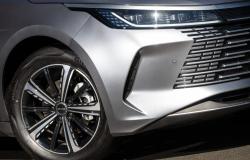Beer bottles decorated with the five olympic rings They are already coming off the production line of the brewery Anheuser-Busch InBev N.V. in Belgiumin preparation for the paris games this summer.
It has been 100 years since the last time the french capital welcomed the Olympic Games summer, and the city wants to leave a mark after the Covid would mean that the Tokyo Games They will be held in practically empty stadiums. And now, for the first time, there will be a beer sponsor for an event that showcases the pinnacle of human sporting achievement. But in this case the drink, Crown Zerodoes not contain alcohol.
The largest brewer in the world has decided to announce to billions of sports fans a non-alcoholic product launched in Europe just two years ago. AB InBev expect to use the Paris Games –which are expected to be one of the biggest marketing bonanzas the Olympics have ever seen– to improve its position in the only part of the global beer industry that is actually growing.
Worth $13 billion and counting, brands from Heineken until Guinnessand now Crown Zerothey see a cohort of health-conscious consumers – many young people, others older and wanting to get out of the alcohol culture – whose wallets can take advantage.
The brewmasters have been working on formulas to try to replicate the taste and texture of the real product. Heineken, Guinness and Budweiser They are now available non-alcoholic, while hundreds of craft breweries and newer labels are emerging to target the market. For Michel Doukerisexecutive director of AB InBev, It’s quite simple: “The consumer has changed.”.
Non-alcoholic beer, or beer with an alcohol content of less than 0.5%, is a small corner of the market: its 31.4 million hectoliters a year dwarf the 1.93 billion hectoliters of alcoholic beer, according to GlobalData Plc. But she has had a CAGR of 3.6% since 2018, compared to 0.3% for alcoholic beer. In USAthe number of adults ages 18 to 34 who say they drink has fallen from 72% in the early 2000s to 62%, according to Gallup.
Those are numbers that companies cannot ignore, especially AB InBev. It is already behind and says it will miss the target of 20% of sales coming from low-alcohol or no-alcohol beer by 2025.”There are many sporting events such as the Olympic Games where iconic brands are often the 0% variant.“, said Susie Goldspinkhead of low and no-alcohol analysis at market research firm IWSR. “That’s partly because it’s a growing area, but it also helps with their moderation and responsible consumption agenda.”
There is also a broader benefit for brewing companies. Because their non-alcoholic versions often share the same name and labeling as the original beer, promotions help brand awareness and allow companies to circumvent increasingly strict restrictions around alcohol advertising.
The Olympic Games are part of a trend of promoting non-alcoholic beers through sports, including Heineken 0.0 with the Formula 1 and the Guinness 0.0 of Diageo Plc in the rugby tournament Six Nations. Carlsberg A/S last year distributed 400,000 cans of non-alcoholic French beer Tourtel Twist in the cycling race Tour de France.
And in a sign of competition between brands, Carlsberg is positioning Tourtel Twist as the preferred non-alcoholic beer in Paris Games. “We are the official beer of Paris and France,” said Jacob Aarup-Andersen, CEO of Carlsberg. “They are the official beer of the Olympic movement. At events they will serve you Tourtel.”
Athletic Brewing Co.based in USA and which only sells non-alcoholic beverages, says that Olympic sponsorship benefits the entire category. “Sometimes to move the needle you need bigger players who can help raise awareness”said John Walkerco-founder of the company.
For beverage companies, There is a pressing need to keep up with the changing trends that have already proven to be the death knell for many businesses.. More than 7,000 bars in the United Kingdom closed in the last decade, according to the British Beer and Pub Association. While alcohol taxes, rents, costs and regulations played a role, so did changes in drinking habits.
As consumers, particularly demographic groups of the Generation Z and the millennials driven by social mediaare looking to moderate their alcohol consumption, it is better to have a viable and attractive offer rather than turning to a rival brand, soft drink or water. Heineken 0.0 is the leader in the non-alcoholic beer market worldwide, according to GlobalData. Other big sellers are the Japanese Suntory All-Free and Brahma 0.0%property of AB InBev.
In the world’s oldest operating German brewery, non-alcoholic beers have been produced since the early 90s. But in 2020, thanks to increased demand, Weihenstephanproperty of Bavaria, more than doubled its non-alcoholic beer capacity, betting on future growth. Nowadays, its non-alcoholic wheat beer represents almost 10% of sales and its third best-selling product. But all the promotion in the world can only go so far if non-alcoholic beer is no good.
Until relatively recently, non-alcoholic beer compared poorly to the original, leaving drinkers dissatisfied. For brewers, there was a technical conundrum: how to achieve depth of flavor without alcohol. Do you prevent the beer from forming alcohol during the fermentation process or do you remove it after brewing an undiluted version?
According to Jim KochPresident of Boston Beer Companythat makes Samuel Adams, Advances in flavor have only been possible in recent years when brewers discovered a low-temperature distillation process. The brewery presented its own non-alcoholic product, Just The Hazein 2021.
Launched in 2017, Heineken 0.0 is made with water, barley malt, hop extracts and yeast, the same ingredients used to Heineken. Then, The alcohol is removed by vacuum distillation, after which the natural flavors and aromas are remixed to make the taste more like the original.
“For a couple of years I refused to start developing Heineken 0.0”said Willem van Waesbergheworld brewmaster of Heineken. “Because I had never tried a good one.” The Olympic Games will begin in two months and the opening ceremony will take place on July 26. AB InBev will soon release details of its campaign, which it hopes to “accelerate the growth of non-alcoholic beer.”
Beyond that, it is expected that Having non-alcoholic beer on tap represents the next leap in terms of volumes, increasing sales in bars by making the drinks more socially acceptable. It’s yet another technical challenge, but one that the brewers are working on.
“It’s like rosé in the south of France is always better than at home”said Waesberghe. “And in a bar you like the draft, it gives you the impression of authenticity”.






